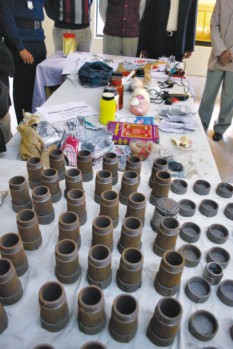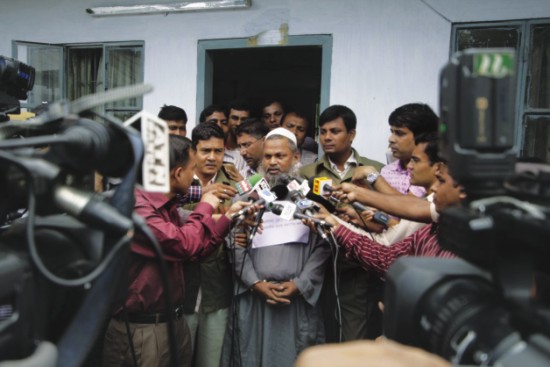
Inside
|
In People We Trust Z. TARIQ ALI outlines the potency of the common man against fundamentalism
In Pakistan, Taliban forces, after their expulsion from Swat and Waziristan last winter, have again established control in the area. The resurgence of the fundamentalists proves that the use of conventional military forces is not the answer to a political problem. In Bangladesh, we want to stymie the growth of fundamentalism before it has gained enough strength to engulf the minds of the people, and that is why the need for a broad-based citizens' group against any form of intolerance has become so important. Lately there have been many arrests of JMB, HUJI and Tahrir operators in different parts of the country. Their revelations as to the scope and the extent of their penetration have left many of us startled. Startled, because had it not been for their frank admission, our society would never have been able to fathom the extent and the depth of their engagement in Bangladesh. It is time to act quickly so that this extremism, which has no religious sanction, is uprooted from our society. Both the government and the civil society have to act together to battle this problem. Fortunately for us, our society, unlike Pakistan's, is an inclusive society and would never get the nourishment it needs in order to become a viable force. Moreover, this nation was born 40 years ago after a war against the very obscurantism that these forces promote. We are fortunate that despite veering very close, we have not had state sponsored Islamisation in the way the Zia zeal (I meant Ziaul Haque, by the way) promoted it. Cultural differences also play a big role, and no matter how romantically the "nekab, moru-shahara and the moon behind the Khejur tree" have tried to be transplanted into the Bengali psyche, these icons have failed to capture the imagination of the Bengalis. Cultural transplants do not usually succeed: in Indonesia the surge of Islamic empathy that welled up there immediately after 9/11 has ebbed out, thanks to the intelligent handling by the Indonesian government. Their homegrown terrorists seem to have lost their punch and their will. Going back to our JMB operators, their admissions have proved that the party which hypocritically claims to carry the Islamic flag would not bat an eyelid to lie in the name of God, as they did when they claimed that terrorism was an invention of the media. They, however, do not lie when they say they will capture state power in Bangladesh within a decade or two -- because they firmly believe they can. They are gradually playing out the etudes to the finale, i.e. a push to seize the state. All this is being orchestrated and managed by people with Wahabi fervour in the Gulf, who firmly believe that they will create a worldwide Dar-ul-Islam under an Islamic mantle within this century, and to whom the likes of Kader Mollah regularly go for support and advice. The advantage that these think tanks have is that Islam has always had global ambitions, and possesses the energy, the will and the finances to carry this dream forward. Such an ambition is also fuelled by the projections of the Islamophobes in the western media that Europe will become a Muslim continent, euphemistically called Eurabia, within 70-80 years. This alarm is largely unfounded because the Islamic birth rates, which are high in Europe right now, will also decline in these countries, as the second or third generation European Muslims emerge. The second or third generation of European Muslims may also take the leadership in making Islam more integrated with the societies around them, and also become the catalysts to "an age of Islamic enlightenment" that will be good for mankind. However, these new messengers of Islam will become viable only if they learn to deal with their environs with an inclusive bent of mind, and not dismiss science and technology outright and view religion rationally, instead of making sweeping statements like one hears on Islamic television all the time.
However, such enlightenment can come only if the Wahabi jihadists give up their dreams of a Dar-ul-Islam as unattainable. Science and technology has always multiplied in a geometric fashion, and it is ridiculous to expect that Islam, or the orient in general, will ever bridge the technology gap of 500 years which the west has managed to assemble over us. We may take hints from the fact that no university in the Islamic world is in the list of the top 500 universities of the world. And it is the university research stations where knowledge and technology is born and reared. It would be childish to expect that the West will press the "self-destruct" button and sink into darkness for two centuries so that the rest of the world can catch up. What we should then be content with -- for the foreseeable future at least -- is generally playing second fiddle to the West and hope that one day, a century or two later, the societies will have reached an equilibrium and therefore a semblance of parity. For the moment, we should be happy with setting up mechanisms to safeguard against the wanton plunder of human labour by the West (unfortunately that is all the wealth which the Orient -- except for China -- is left with). It is this never ending fountain of human resource which is our greatest strength, and an ageing West will certainly need the muscles of our young people to sustain the comforts that they have become used to. And to an already jittery west, we should keep demonstrating that ours is a moderate and inclusive nation, and take up massive media campaigns in the West to promote this face of ours. Bangladesh is blessed because such a huge part of its labour force is female labour, people transplanted straight from their villages, who take no time to acquire working skills, as well as the knowledge about their rights to a fair wage. It is the sheer numbers of this liberated female work force that would prevent fundamentalism from taking hold in this country, because fundamentalist tendencies would take away their independence and their rights to a better lifestyle. Bangladesh is also lucky that China, the world's greatest manufacturing base, is already pricing itself out of the low technology areas where Bangladesh has the training and infrastructure to step in. Let us show our "tolerant face" and our moderation to the foreign investors so they feel safe and confident about putting their money in industries here. The objective of the fundamentalist camp is to keep the population mired in the poverty tangle so they can wave the wand of religion as having all the answers, and issue fatwas against women at the workplace (like they have done in India recently). Let us not give them that opportunity. We are in a way fortunate that the BDR rebellion did not take the nasty turn that some quarters wanted it to take, and that again proves how much superior politics is over regimentation. However, some damage has been done because during Ershad's regime and the last BNP-led government, we were pretty close to an atmosphere of religiosity being allowed to gain a grip on the government. The Pakistan-trained officers are all retired now and all vestiges of that "romanticism about Islam's soldiers" is gone. Although the Jamatis have made considerable infiltration, they have not gained a foothold, thankfully, to make a serious dent, yet. The efforts of the mancha in a PPP framework with the social welfare ministry may indeed, be an interesting idea to investigate and promote. Z. Tariq Ali is a social worker and an adviser to the Liberation War Museum.
|
 A
A